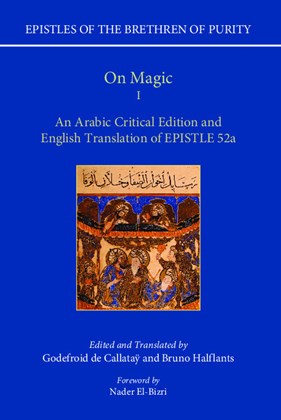On Magic, Part I An Arabic Critical Edition and English Translation of Epistle 52a
Oxford University Press in association with the Institute of Ismaili Studies
The Ikhwān al-Ṣafāʾ (Brethren of Purity), the anonymous adepts of a tenth-century esoteric fraternity based in Basra and Baghdad, hold an eminent position in the history of science and philosophy in Islam due to the wide reception and assimilation of their monumental encyclopaedia, the Rasāʾil Ikhwān al-Ṣafāʾ (Epistles of the Brethren of Purity). This compendium contains fifty-two epistles offering synoptic accounts of the classical sciences and philosophies of the age; divided into four classificatory parts, it treats themes in mathematics, logic, natural philosophy, psychology, metaphysics, and theology, in addition to didactic fables.
Epistle 52a consists of the shorter of two versions circulating as the final epistle of the corpus, ‘On Magic’. In this version, the authors regard magic and other occult sciences as the culmination of their own philosophical teaching, and they justify the ‘rightful use’ of these disciplines, especially astral magic, with reference to great authorities of the past, such as works of Plato and Abū Maʿshar, the Quʾran, or even Jewish stories allegedly from the Torah. Most interestingly, the text occasions an extended account, unparalleled in Islamic literature in its sympathetic approach, of the mysterious Ṣābiʾans of Ḥarrān. The present edition is accompanied by comprehensive footnotes and a substantial introduction, which argues for the authenticity of this treatise and offers a glimpse of the significant impact it exerted on later works in this field such as the Ghāyat al-Ḥakīm (Picatrix).
Acknowledgements
Foreword
Introduction
Technical Introduction
Epistle 52a: On Magic
Select Bibliography
Subject Index
Index Locorum
Risāla 52a (Arabic Text & Variants)
Arabic Index
'The publications that are planned within this project will no doubt rekindle the interest of scholars and students of Islam in Islam's rich cultural, educational and historical legacy . . . The work of the Ikhwan al-Safa, like many other works that make up the classical Muslim educational thought, need to be seriously studied and reflected upon. This new publication project contributes immensely towards realizing this educational aim.'
– Abdullah Sahin, Muslim World Book Review - about Epistles of the Brethren of Purity series
'The editors and translators of this short epistle on magic have provided a model of careful and thorough scholarship applied to a difficult and esoteric text.'
– Emilie Savage-Smith, Times Literary Supplement
Godefroid de Callataÿ is Professor of Arabic and Islamic Studies at the Oriental Institute of the University of Louvain. He has specialized in the history of Arabic sciences and philosophy, and the role played by Islam in the transmission of knowledge from Greek Antiquity to the Latin West during the Middle Ages. Amongst other subjects, he is the author of numerous articles and books on the Brethren of Purity, including his French translations of Epistles 7, 28, and 36, and his latest volume, Ikhwan al-Safa’: A Brotherhood of Idealists on the Fringe of Orthodox Islam. Since 2003, he also directs a project on Arabic and Latin encyclopaedias of the Middle Ages at the University of Louvain.
Bruno Halflants was involved in various major projects during his first career as a civil engineer. He has cultivated his interest in Arabic since 1978, focusing on Arabic poetry and metrics, and in 1998 he obtained a master’s degree in Arabic. In 2007, he published Le Conte du Portefaix et des Trois Jeunes Femmes, a study of Middle Arabic in the 1001 Nights, with an original edition of the tale’s earliest-known manuscript. Further to this, he has participated in several colloquies and seminars and has contributed to the forthcoming Autour de la Langue Arabe. He is currently working on the long version of Epistle 52: ‘On Magic’, to be published later in this series.

